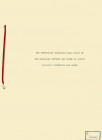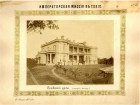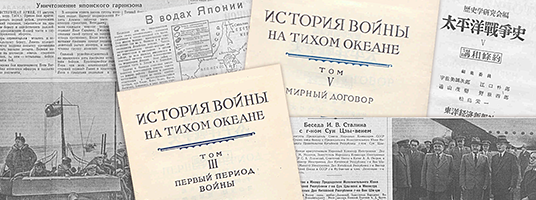Political Relations
Exchange of congratulatory telegrams between the People's Commissar for Foreign Affairs of the USSR GV Chicherin and Japanese Foreign Minister K. Sidehara on the occasion of the conclusion of the Convention on the Basic Principles of Relations between the USSR and Japan
[January 22, 1925].
Letter from the Deputy People's Commissar for Foreign Affairs of the USSR, L. M. Karakhan Viscount Goto, with congratulations on the conclusion of the Convention on the basic principles of relations between the USSR and Japan
Peking, February 27th, 1925.
Visitor reply letter to Goto L.M. Karahanu
Tokyo, 6. Maerz 1925.
Consular patent of the Consul General of the USSR in Tokyo KA Ligsky
Moscow, April 28, 1926.
Politburo Resolution (b) the preservation of the Japanese Consulate in Vladivostok, Petropavlovsk and on Sakhalin and the preservation of the Soviet consulate in Seoul and Hakodate Tsuruga
Letter from the Prime Minister of Japan I. Hatoyama To the Chairman of the Council of Ministers of the USSR NA Bulganin expressing gratitude for the support of Japan's request to join the UN
December 1956.
Exchange of congratulatory telegrams between USSR Minister of Foreign Affairs Andrei Gromyko and Japanese Foreign Minister K. Miyazawa on the occasion of the 50th anniversary of the establishment of diplomatic relations between the USSR and Japan
The exchange of messages between the Minister of Foreign Affairs of the Russian Federation Igor S. Ivanov and the Minister for Foreign Affairs of Japan M. Komura on the occasion of the 140th anniversary of the opening in Japan, in Hakodate, the first Russian consulate
December 1998.
Press statements following Russian-Japanese negotiations, 29 June 2019 14:00
Russian-Japanese relations at the present stage: problems and prospects
Pages
- Protocols, charters and treaties
The draft charter of Emperor Nicholas I to the Emperor of Japan on sending Vice Admiral E. Putyatin to Japan and the desire to establish trade relations
Russia. The Emperor (1825-1855; Nicholas I). The draft charter of Emperor Nicholas I to the Emperor of Japan on sending Vice Admiral E. Putyatin to Japan and the desire to establish trade relations. 1852.The credentials of the Extraordinary Envoy and Plenipotentiary Minister of Japan to Russia, Vice-Admiral Enomoto Takeaki
The credentials of the Extraordinary Envoy and Plenipotentiary Minister of Japan in Russia, Vice-Admiral Enomoto Takeaka.
1873.Charter of the Japanese government on awarding Moscow with the Japanese Order of the Double Rising Sun
Charter of the Japanese government on awarding Moscow with the Japanese Order of the Double Rising Sun.
1883.Protocol on the opening of consulates in Russia and Japan, signed on July 15/28, 1907.
Protocol on the opening of consulates in Russia and Japan, signed on July 15/28, 1907.
St. Petersburg: Senate Printing House, 1907.Charter of the Japanese government on awarding an employee of the Russian embassy Andrei Mandelstam with the Japanese Order of the Sacred Treasure of the 3rd degree
Charter of the Japanese government on awarding an employee of the Russian embassy Andrei Mandelstam with the Japanese Order of the Sacred Treasure of the 3rd degree.
1908.Convention on the Basic Principles of Relations between the USSR and Japan
THE USSR. Contracts Convention on the Basic Principles of Relations between the USSR and Japan.
Beijing, January 20, 1925.Joint Declaration of the Union of Soviet Socialist Republics and Japan
Joint Declaration of the Union of Soviet Socialist Republics and Japan. Moscow, October 19, 1956.Tokyo Declaration on Russian-Japanese Relations
Tokyo Declaration on Russian-Japanese Relations.
Tokyo, October 13, 1993.The Moscow Declaration on the Establishment of a Creative Partnership between the Russian Federation and Japan
Russian Federation. President (1991-1999, Boris N. Yeltsin). Moscow Declaration on Establishing a Creative Partnership between the Russian Federation and Japan.
Moscow, November 13, 1998. - Visual materials
Photo of the main house (front facade) of the Russian Imperial Embassy in Tokyo
Photo of the main house (front facade) of the Russian Imperial Embassy in Tokyo. November 11, 1877.Photo of the building of the Russian Imperial Consulate in Yokohama
Photo of the building of the Russian Imperial Consulate in Yokohama.
1902.Photo of the parade hall of the Russian Imperial Embassy in Tokyo
Photo of the parade hall of the Russian Imperial Embassy in Tokyo. January 12, 1915. - Russo-Japanese War of 1904-1905
A series of turbulent events of the 20th century began for Russia from a war far in the east. Japan, which unleashed the war, blockaded and besieged Port Arthur, the main base of Russian naval forces in the Pacific. The defense and the subsequent surrender of the fortress became a tragic symbol of the war. Military setbacks, the largest of which were the overland Battle of Mukden and the Tsushima Naval Battle, the name of which became common, were one of the causes of the revolution of 1905-1907 forcing the Russian part to agree to a compromise and sign a peace treaty. The local war turned for Russia into the loss of the entire Navy and the loss of strategic positions in the Far East.
- Soviet-Japanese War of 1945
The entry of the USSR into the war with Japan was agreed upon at the Yalta Conference and confirmed at the Potsdam Conference. The circumstances surrounding the declaration of war, as well as the 1941 Neutrality Pact with Japan, are of particular interest. Unique declassified materials from World War II archives allow us to reconstruct the sequence and logic of events. To make it easier for readers, Presidential Library has included the most important documents in a collection dedicated to the Soviet-Japanese war.

























